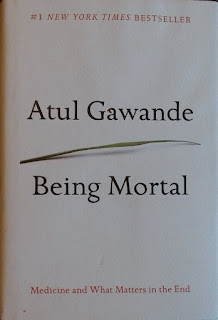This book review was written by Eugene Kernes
“Death, of course, is not a failure. Death is normal. Death may be the enemy, but it is also the natural order of things.” – Atul Gawande, Introduction, Page 8
“Still, there are costs to averting our eyes from the realities. We put off dealing with the adaptations that we need to make as a society. And we blind ourselves to the opportunities that exist to change the individual experience of aging for the better.” – Atul Gawande, Chapter 2: Things Fall Apart, Page 35
“The terror of sickness and old age is not merely the terror of the losses one is forced to endure but also the terror of the isolation. As people become aware of the finitude of their life, they do not ask for much. They do not seek more riches. They do not seek more power. They ask only to be permitted, insofar as possible, to keep shaping the story of their life in the world – to make choices and sustain connections to others according to their own priorities.” – Atul Gawande, Chapter 5: A Better Life, Page 146-47
Overview:
The medical profession is generally trained to resolve problems, to fix problems. But age is a normal function that continuously makes life more difficult. Age cannot be fixed. The medical profession can patch the body, but always temporarily and usually with other consequences. Even if a person does everything right, they will still accumulates problem and end with death. Making more correct health choices over a life time can reduce the chances of many age-related symptoms, but death cannot be overcome. Not thinking about the aging process, prevents individuals from adapting to the differences. Only by accepting the fragility of life, can an individual change to make the aging experience better.
The problems of age are a recent human phenomenon. Historically, old age was rare, as people did not survive to experience the ravages of age. Medicine made many previously fatal events, not mortally threatening, therefore prolonging life. Medicine has even slowed down many mortal threats. Slowed down their progression, but not cure them. Death is still the final outcome. There are those who do not fear death, but fear what happens before death. The loss of function, and friends. Perspective changes when primed by age. Perspective that reorients priorities away from vanities, power, and achievements, and towards appreciating everyday pleasures, and connecting with others.
As people age, they become more dependent on others, but they do still want to live at home and be independent. Nursing homes tend to relieve family members of the burden of taking care of the elderly, not of making life worth living for those people. There are facilities that enable elders to live as well as they can, by bringing to them things that make life worth living.
For the elderly, choosing freedom does not mean that health is sacrificed. Research showed that those who had more independence, had better physical, cognitive, and mental health. Better outcomes, at lower costs.
There are people that can be very active in old age. But that is a rarity. Biological luck. Making everyone else feel like a failure. Distracting everyone else from adapting to
their situations. For most, the fragile
body will continue to weaken.
Caveats?
This is a very emotionally jarring book. The reader must come prepared emotionally to handle the topic. Without even much prompting, the book forces the reader to reflect on one’s own life. One’s own mortality. One’s own inevitabilities. This reflection, the acknowledged finite time of one’s life, can make individual’s change the choices that they make.
This book uses many examples to highlight the problems with
how the society deals with aging.
Sometimes, the author gets lost in the examples, which distracts from
the problem that needs correcting.
